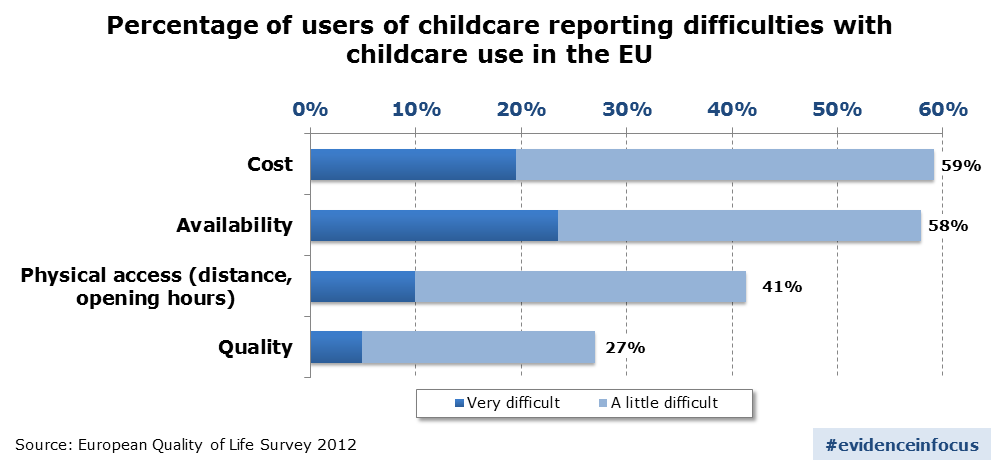Childcare for all: making early childhood education and care more accessible and inclusive
Unpublished
(From ec.europa.eu)
© Christopher Futcher / Getty Images
Access to early childhood education and childcare (ECEC) is important for promoting equal opportunities of children as well as for facilitating work-family balance of parents and especially labour market participation of mothers of small children.
EU countries vary a great deal in terms of how childcare is provided and how accessible services are.
Barriers to access
Access to childcare services can be made difficult by several barriers such as cost, opening hours or poor quality. The latest wave of the European Quality of Life Survey provides information about the obstacles for Europeans to use these services (see chart below - click to enlarge).
Cost constituted a barrier for 59% of respondents, rising up to 78% in Greece, Malta and the UK. The lack of childcare services and waiting lists (availability) was seen as a barrier by 58% of service users on average across Europe, but this could be as high as 70% in Greece and France. Physical access is an issue for about 41% of the people interviewed. Lastly, the poor quality of services was mentioned as a barrier by 27%, with concerns over quality being more widespread in Romania (47%) and Greece (63%).
Disadvantaged groups and inclusive practices
In addition to these barriers, it is important to bear in mind that there are children from disadvantaged groups who experience additional difficulties when it comes to access to mainstream childcare services.
This includes children who have for example an immigrant or Roma background, who live in poor families, who have learning difficulties, or who have a disability. At the same time, these are the children that are most likely to benefit from good quality childcare.
Some of the barriers encountered include negative attitudes from staff and/or the parents of other children, lack of appropriate teaching and learning resources, and lack of staff trained in dealing with diversity or detecting special needs early.
Eurofound has identified inclusive practices in childcare that have been successful in including children in a vulnerable situation in mainstream childcare services. This includes:
- training childcare staff or support to them provided by specialists,.
- additional funding schemes, and.
- establishing inclusive education plans.
The examples of good practice show that it is particularly important to build partnerships between childcare centres and social services or also NGOs, as this improves the outreach to children in a vulnerable situation. Involving local authorities is also perceived as essential in implementing the changes, as ECEC services cannot implement changes on their own and need financial and political backing. This also allows for continuous feedback and interaction between policy and practice.
Author: D. Molinuevo works as a research officer at Eurofound (European Foundation for the Improvement of Living and Working Conditions).
The views expressed in this article are those of the author and do not necessarily reflect the views of the European Commission.
Editor's note: this article is part of a regular series called "Evidence in focus", which puts the spotlight on key findings from past and on-going research at DG EMPL.
